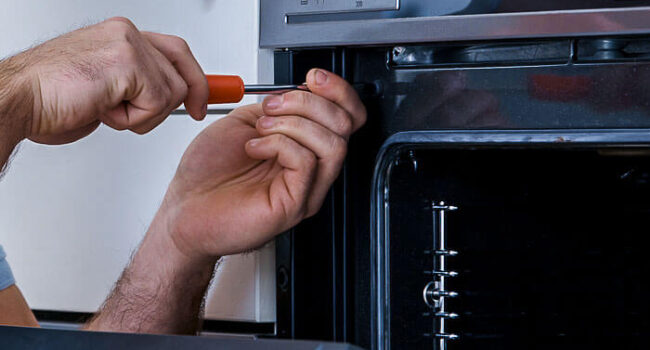Washer Repair Service
No need to get your hands dirty in fixing a non-working appliance, let our washer repair mans assist you. Our highly-rated washing machine fixers can provide speedy diagnoses and repairs on all types of washing machines from top brands such as Miele, Electrolux, Samsung, and more.
Our Washing Machine Repair Services
We repair and provide maintenance for all major brands of washing machines at affordable prices. Our technicians will first examine the washing machine thoroughly, troubleshoot it to find the underlying cause of the problem and, finally, work-out a plan to fix it.
Top-loading washing machines
These machines have a lid on top of the unit and an agitator in the middle of the wash drum. They are the most common type of washing machine.
Front-loading washing machines
These machines have a door on the front of the unit and do not have an agitator. They use a tumbling action to clean clothes.
High-efficiency (HE) washing machines
These machines are designed to use less water and energy than traditional top-loading washing machines. They may be top-loading or front-loading.
Portable washing machines
These machines are smaller and can be moved from room to room. They are often used in apartments or small spaces.
Combination washer-dryer units
These machines combine a washing machine and a dryer in one unit. They are often used in small spaces where there is no room for a separate washer and dryer.
Smart washers
These are washing machines with advanced features that can be controlled remotely using a mobile app. Common issues include Wi-Fi connectivity problems, software glitches, and control board malfunctions.
It’s important to note that regardless of the type of washing machine, repairs should always be carried out by a professional appliance repair technician.
Our Washer Repair Clients Common Questions
Washing machines can be fixed by professional appliance repair technicians who specialize in repairing and maintaining home appliances. It is important to choose a qualified and experienced technician who has the necessary skills and tools to diagnose and repair the specific problem with your washing machine. Some common repairs can be done on-site, while others may require the washing machine to be taken to a repair center.
Whether it is worth it to repair a washing machine depends on several factors, such as the age of the machine, the cost of the repair, and the cost of a new washing machine.
In general, if the repair cost is less than half the cost of a new washing machine, it may be worth repairing the machine. However, if the machine is more than 10 years old, it may be more cost-effective to replace it with a new, energy-efficient model that will save money on energy bills over time.
Diagnosing a broken washing machine can be done by following these steps:
- Check for power supply: Make sure the washing machine is properly plugged in and that the circuit breaker or fuse hasn’t tripped.
- Check for water supply: Make sure the water supply to the washing machine is turned on and the hoses are properly connected.
- Check for any visible damage: Inspect the washing machine for any visible damage, such as cracks or broken parts.
- Check for error codes: Many modern washing machines have error codes that can help diagnose the problem. Refer to the user manual or manufacturer’s website for a list of error codes and their meanings.
- Check for strange noises: Listen for any unusual noises such as grinding, knocking, or banging that could indicate a problem with the motor, drum, or other components.
- Check for leaks: Check for any water leaks from the washing machine. Leaks can be caused by a variety of issues such as a broken hose or a faulty seal.
- Test the machine: Run a cycle on the washing machine and observe its behavior. Note any unusual sounds or movements, and whether the machine is able to complete the cycle.
If you are unable to diagnose the problem with your washing machine, it is best to consult a professional appliance repair technician who has the knowledge and tools to diagnose and repair the issue.
The cost to fix a washing machine can vary depending on the specific problem, the make and model of the machine, and the location of the repair service. On average, the cost to repair a washing machine ranges from $100 to $500, with most repairs falling in the $200 to $300 range.
Keep in mind that these are just estimates and the actual repair costs may vary depending on your specific situation. Additionally, if your machine is older or has multiple problems, it may be more cost-effective to replace it instead of repairing it.
Cost To Repair Washer Machines Common Problems
The cost to repair a washer machine can vary depending on the specific problem and the location of the repair service. Here are some most common washer problems and their estimated repair costs:
Service
Price
Order
Washing Machine Brands We Repair
We support all major brands of washing machines:
Hotpoint
Jenn-Air
Kenmore
Bosch
Samsung
GE
Maytag
Amana
Roper
Asko
Whirlpool
Admiral
Electrolux
Frigidaire
LG
Same-day Clothes Washer Repair Service
Leave a request or call us yourself to agree on a convenient time for the master arrival.
Our Washer Repair Services Area
We do local Washer Repair Services in Los Angeles area.
Washer Machine Troubleshooting FAQ and Tips
Repairing a washing machine yourself is possible if you have the necessary skills, experience, and tools. However, it is important to note that washing machines are complex machines with many moving parts and electrical components, and attempting to repair them without proper knowledge or experience can be dangerous and may cause further damage to the machine.
If you are experienced in repairing appliances and have the necessary tools, you may be able to repair simple issues such as a clogged drain or a broken belt. However, more complex issues such as electrical problems or motor issues may require specialized knowledge and tools.
If you are unsure about your ability to repair a washing machine or if the issue is complex, it is best to consult a professional appliance repair technician. They have the necessary knowledge and tools to diagnose and repair the problem safely and effectively.
The lifespan of a washing machine can vary depending on the usage and the quality of the machine. On average, a washing machine can last between 8 to 12 years. However, with proper maintenance, some machines can last even longer.
Factors that can affect the lifespan of a washing machine include frequency of use, load size, water quality, and the quality of the machine itself. High-quality machines that are used less frequently and maintained properly can last longer than lower-quality machines that are used more frequently and not maintained properly.
Regular maintenance such as cleaning the machine, checking hoses and connections, and fixing issues as soon as they arise can also extend the life of a washing machine. It is important to follow the manufacturer’s recommendations for maintenance and to have the machine inspected by a professional if any issues arise.
The most expensive part to replace on a washing machine can vary depending on the make and model of the machine, as well as the specific issue being addressed. However, in many cases, the most expensive part to replace is the motor.
The motor is a critical component of the washing machine, and it can be expensive to replace due to the complexity of the part and the labor involved in the replacement process. Other expensive parts that may need to be replaced include the control board, transmission, drum assembly, and door seal.
If you are experiencing issues with your washing machine, it is best to consult a professional appliance repair technician who can diagnose the issue and provide an estimate for any necessary repairs. They can also help you determine which parts need to be replaced and the cost involved.
Generally, you do not need a plumber to replace a washing machine. However, you may need a professional to help you disconnect the old machine and install the new one, especially if you are not experienced with plumbing or electrical work.
To replace a washing machine, you will need to disconnect the old machine from the water supply and drain lines, as well as the electrical outlet. You will then need to move the old machine out of the way and install the new machine, reconnecting it to the water supply and electrical outlet.
If you are comfortable with plumbing and electrical work, you may be able to handle the installation yourself. However, if you are unsure or do not have experience with these tasks, it is best to hire a professional to ensure that the installation is done correctly and safely.
If your washer is not spinning, there are several things you can check before calling a professional. Here are some troubleshooting steps to follow:
- Check the load: Make sure that the load in the washer is balanced and not too large. If the load is unbalanced or too heavy, the washer may not spin properly.
- Check the lid switch: If the lid switch is broken or malfunctioning, the washer may not spin. Check to see if the lid is properly closed and the switch is engaged.
- Check the motor coupler: The motor coupler connects the motor to the transmission. If it is broken or worn out, the washer may not spin. Look for any signs of wear or damage.
- Check the drive belt: If the drive belt is broken or worn out, the washer may not spin. Look for any signs of wear or damage.
- Check the motor: If the motor is not functioning properly, the washer may not spin. Look for any signs of overheating, burning smells, or other issues.
If none of these troubleshooting steps resolve the issue, it may be best to call a professional appliance repair technician to diagnose and fix the problem. They can help you determine the cause of the issue and provide an estimate for any necessary repairs.
If your washer is banging during the spin cycle, there are several potential causes:
- Unbalanced load: An unbalanced load can cause the washer to become off-balance during the spin cycle, resulting in banging or thumping. Try redistributing the load evenly and restarting the cycle.
- Worn or damaged suspension rods or springs: The suspension rods or springs hold the drum in place during the spin cycle. If they are worn or damaged, the drum may be able to move around too much, resulting in banging or thumping. Check for any signs of wear or damage and replace if necessary.
- Damaged or worn drum bearings: If the drum bearings are damaged or worn, the drum may wobble during the spin cycle, resulting in banging or thumping. This is a more serious issue that will likely require professional repair.
- Loose parts: Check for any loose parts or screws that may be causing the banging or thumping.
If you are unable to determine the cause of the issue, it may be best to call a professional appliance repair technician to diagnose and fix the problem. They can help you determine the cause of the issue and provide an estimate for any necessary repairs.
If your washer is not spinning or draining, there are several potential causes:
- Clogged or faulty drain pump: The drain pump is responsible for removing water from the washer. If it is clogged or not functioning properly, it can prevent the washer from draining. Try cleaning out any debris from the pump and its filter, and if that doesn’t work, it may need to be replaced.
- Faulty lid switch: The lid switch is a safety feature that prevents the washer from spinning or draining if the lid is open. If the switch is faulty, it may prevent the washer from spinning or draining even when the lid is closed. Try testing the switch with a multimeter and replacing it if necessary.
- Broken belt: If the belt that connects the motor to the drum is broken or worn out, it can prevent the washer from spinning. Check the belt for any signs of wear or damage and replace if necessary.
- Malfunctioning motor: If the motor that powers the drum is not functioning properly, it can prevent the washer from spinning. This is a more serious issue that will likely require professional repair.
- Clogged or kinked drain hose: A clogged or kinked drain hose can prevent water from draining properly. Check the hose for any blockages or kinks and straighten it out if necessary.
If your washer drain hose is clogged, you may notice one or more of the following signs:
- Water backing up into the washer: If the drain hose is clogged, water may not be able to flow out of the washer properly, causing it to back up into the machine.
- Slow draining: If water is draining slowly from the washer, it could be a sign that the drain hose is clogged.
- Gurgling sounds: If you hear gurgling sounds coming from the drain hose or the drain, it could be a sign that the hose is partially clogged.
- Foul odors: A clogged drain hose can cause water to back up and sit in the washer, leading to foul odors.
To check if your washer drain hose is clogged, you can disconnect the hose from the washer and inspect it for any blockages. If you see any debris or buildup, you can try removing it by running water through the hose in the opposite direction. You can also try using a plumber’s snake or a wire hanger to remove any blockages.
Our Washer Appliance Repair Recent Articles
-
What to Do If Your Whirlpool Washer Does Not Turn On?
There is nothing more frustrating than having a pile of dirty laundry and a washing machine that won't turn on. Whirlpool is a trusted brand…
Read More


